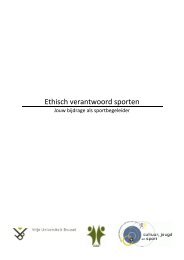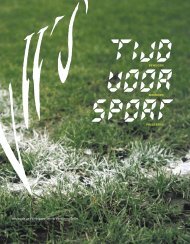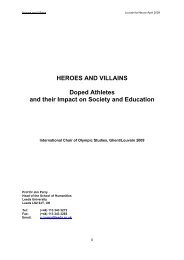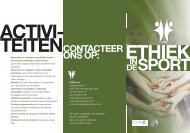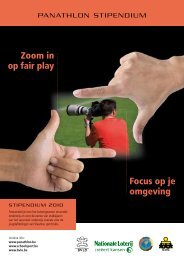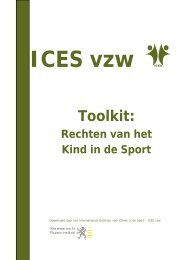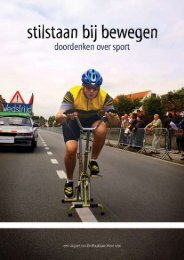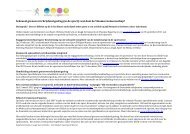Part 3 GLOBAL ISSUES: HARASSMENT AND ABUSE RESEARCH
Part 3 GLOBAL ISSUES: HARASSMENT AND ABUSE RESEARCH
Part 3 GLOBAL ISSUES: HARASSMENT AND ABUSE RESEARCH
You also want an ePaper? Increase the reach of your titles
YUMPU automatically turns print PDFs into web optimized ePapers that Google loves.
Despite important differences in perceptions of what is considered as<br />
unacceptable, there were no significant differences at item level in the reported<br />
prevalence of coach behaviours between the two samples. Major differences in<br />
reported prevalence only appeared after the behaviours were grouped according to<br />
the respective perceptions of KULeuven or VUBrussels students. The explanation<br />
for the significant differences in perceptions may lie in the different philosophical<br />
orientations of the two universities (differences in the type of student that selects to<br />
go to KULeuven or VUBrussels, and different curricula).<br />
The figures based on the most tolerant perception revealed that reported<br />
serious and unacceptable behaviour from the coach is still around an alarming<br />
prevalence level of 20%. Moreover, if we consider the athlete’s perspective as an<br />
indicator of inflicted harm we must not take the most tolerant perception as a<br />
reference. Prevalence figures of unacceptable and serious coach behaviour in<br />
Flanders/Belgium vary between 20% and 50%. Although we are aware of difficulties<br />
related to international comparisons we dare to conclude that the Flanders/Belgium<br />
figures are comparable to those found in the USA, the UK, Australia and the<br />
Scandinavian countries and undoubtedly suggest an evidential trend that sport<br />
governing bodies of sport cannot deny.<br />
Notes<br />
1. Flanders is the Dutch-speaking part of Belgium and includes 60% of the population.<br />
2. We would like to thank the following people for their collaboration: Jos Feys, Karlien Van Kelst<br />
and Christophe Indigne.<br />
3. Although apparently innocent coach behaviour may not be so innocent at all: see the grooming<br />
process, described in chapter 3.5.<br />
4. Brackenridge, C. H., ''He owned me basically...” Women's experience of sexual<br />
abuse in sport, International Review for the Sociology of Sport, 1997, 32, pp. 115-30.<br />
5. Fasting, K., ‘Research on sexual harassment and abuse in sport’, 2005, available at<br />
http://www.idrottsforum.org/researchers/faskar.html.<br />
6. Fejgin, N., and Hanegby, R., ‘Gender and cultural bias in perceptions of sexual harassment in<br />
sport’, International Review for the Sociology of Sport, 2001, 36, pp. 459-78.<br />
60<br />
60



